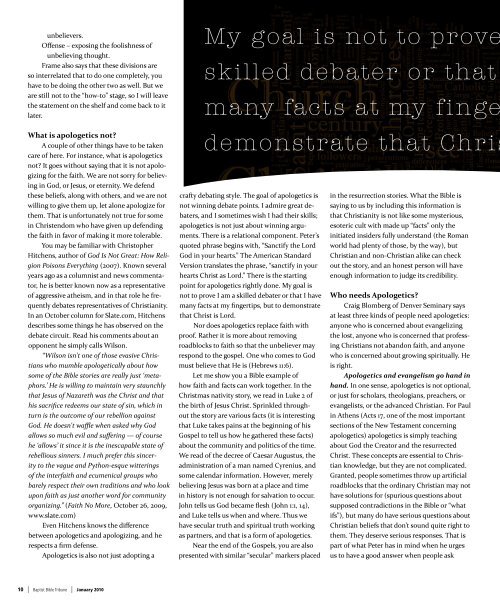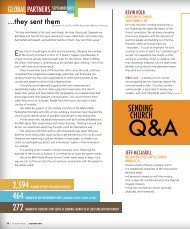Deputation - Baptist Bible Tribune
Deputation - Baptist Bible Tribune
Deputation - Baptist Bible Tribune
- No tags were found...
Create successful ePaper yourself
Turn your PDF publications into a flip-book with our unique Google optimized e-Paper software.
unbelievers.Offense – exposing the foolishness ofunbelieving thought.Frame also says that these divisions areso interrelated that to do one completely, youhave to be doing the other two as well. But weare still not to the “how-to” stage, so I will leavethe statement on the shelf and come back to itlater.What is apologetics not?A couple of other things have to be takencare of here. For instance, what is apologeticsnot? It goes without saying that it is not apologizingfor the faith. We are not sorry for believingin God, or Jesus, or eternity. We defendthese beliefs, along with others, and we are notwilling to give them up, let alone apologize forthem. That is unfortunately not true for somein Christendom who have given up defendingthe faith in favor of making it more tolerable.You may be familiar with ChristopherHitchens, author of God Is Not Great: How ReligionPoisons Everything (2007). Known severalyears ago as a columnist and news commentator,he is better known now as a representativeof aggressive atheism, and in that role he frequentlydebates representatives of Christianity.In an October column for Slate.com, Hitchensdescribes some things he has observed on thedebate circuit. Read his comments about anopponent he simply calls Wilson.“Wilson isn't one of those evasive Christianswho mumble apologetically about howsome of the <strong>Bible</strong> stories are really just ‘metaphors.’He is willing to maintain very staunchlythat Jesus of Nazareth was the Christ and thathis sacrifice redeems our state of sin, which inturn is the outcome of our rebellion againstGod. He doesn't waffle when asked why Godallows so much evil and suffering — of coursehe ‘allows’ it since it is the inescapable state ofrebellious sinners. I much prefer this sincerityto the vague and Python-esque witteringsof the interfaith and ecumenical groups whobarely respect their own traditions and who lookupon faith as just another word for communityorganizing.” (Faith No More, October 26, 2009,www.slate.com)Even Hitchens knows the differencebetween apologetics and apologizing, and herespects a firm defense.Apologetics is also not just adopting aMy goal is not to proveskilled debater or thatmany facts at my fingedemonstrate that Chriscrafty debating style. The goal of apologetics isnot winning debate points. I admire great debaters,and I sometimes wish I had their skills;apologetics is not just about winning arguments.There is a relational component. Peter’squoted phrase begins with, “Sanctify the LordGod in your hearts.” The American StandardVersion translates the phrase, “sanctify in yourhearts Christ as Lord.” There is the startingpoint for apologetics rightly done. My goal isnot to prove I am a skilled debater or that I havemany facts at my fingertips, but to demonstratethat Christ is Lord.Nor does apologetics replace faith withproof. Rather it is more about removingroadblocks to faith so that the unbeliever mayrespond to the gospel. One who comes to Godmust believe that He is (Hebrews 11:6).Let me show you a <strong>Bible</strong> example ofhow faith and facts can work together. In theChristmas nativity story, we read in Luke 2 ofthe birth of Jesus Christ. Sprinkled throughoutthe story are various facts (it is interestingthat Luke takes pains at the beginning of hisGospel to tell us how he gathered these facts)about the community and politics of the time.We read of the decree of Caesar Augustus, theadministration of a man named Cyrenius, andsome calendar information. However, merelybelieving Jesus was born at a place and timein history is not enough for salvation to occur.John tells us God became flesh (John 1:1, 14),and Luke tells us when and where. Thus wehave secular truth and spiritual truth workingas partners, and that is a form of apologetics.Near the end of the Gospels, you are alsopresented with similar “secular” markers placedin the resurrection stories. What the <strong>Bible</strong> issaying to us by including this information isthat Christianity is not like some mysterious,esoteric cult with made up “facts” only theinitiated insiders fully understand (the Romanworld had plenty of those, by the way), butChristian and non-Christian alike can checkout the story, and an honest person will haveenough information to judge its credibility.Who needs Apologetics?Craig Blomberg of Denver Seminary saysat least three kinds of people need apologetics:anyone who is concerned about evangelizingthe lost, anyone who is concerned that professingChristians not abandon faith, and anyonewho is concerned about growing spiritually. Heis right.Apologetics and evangelism go hand inhand. In one sense, apologetics is not optional,or just for scholars, theologians, preachers, orevangelists, or the advanced Christian. For Paulin Athens (Acts 17, one of the most importantsections of the New Testament concerningapologetics) apologetics is simply teachingabout God the Creator and the resurrectedChrist. These concepts are essential to Christianknowledge, but they are not complicated.Granted, people sometimes throw up artificialroadblocks that the ordinary Christian may nothave solutions for (spurious questions aboutsupposed contradictions in the <strong>Bible</strong> or “whatifs”), but many do have serious questions aboutChristian beliefs that don’t sound quite right tothem. They deserve serious responses. That ispart of what Peter has in mind when he urgesus to have a good answer when people ask10 | <strong>Baptist</strong> <strong>Bible</strong> <strong>Tribune</strong> | January 2010
















